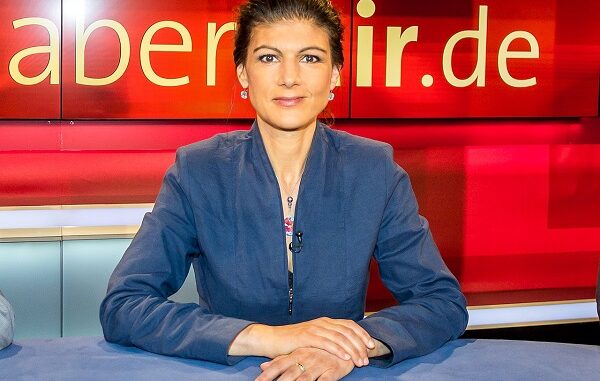
And announces foundation of new party
October 23 was the day on which Sahra Wagenknecht and nine other members of the Bundestag (German parliament) resigned from DIE LINKE (the Left party). At a press conference, they presented the ‘Sahra Wagenknecht Alliance’ (BSW), which aims to found a new party to contest next year’s European elections and three state elections in eastern Germany.
This is no surprise and we have been pointing out for over two years that this development was to be expected because the (power) political conflicts in DIE LINKE could not be resolved.
Four words were mentioned at the BSW press conference as key points for both the Alliance and the future party: ‘Economic Reason, Social Justice, Peace and Freedom’. Sahra Wagenknecht made it clear that her economic policy is about “more competition and a strong middle class” and declared her support for the “meritocracy”. At the time of the deepest systemic crisis of capitalism in almost a hundred years, Sahra Wagenknecht and her comrades-in-arms want to return to a social democratic policy of “social balance” between capital and labour and create the illusion that the “crisis of capitalism” – mentioned only once by Christian Leye in the press conference – has its cause in a wrong economic policy and not in the functioning of the capitalist system itself. It is fitting that Thomas Suikat, an entrepreneur, spoke on the podium of the press conference. In addition to a wealth tax, Suikat spoke in favour of “fair competition” and a defence of the middle-sized entrepreneurs, against large corporations.
One looked in vain for a high-profile trade unionist among the BSW executive members. It was noticeable that there was no mention of the strikes which have taken place this year and no call for class struggle, for trade union self-organisation, for protest – not even for joining the Alliance. On the contrary, Christian Leye made it clear that the association and party would develop “slowly and in a controlled manner” in order to prevent “soldiers of fortune, careerists and people who hold other political views” from flooding into the party. The fact that this concern might have something to do with, among other things, the right-wing migration policy advocated by Sahra Wagenknecht, was, of course, not mentioned. At the press conference, Wagenknecht also spoke of “uncontrolled immigration that overstrains our country” that is “irresponsible” and referred positively to Denmark’s racist immigration policy. Somehow it was fitting that a question from an editor of the far-right newspaper Junge Freiheit was answered as kindly as any other question. Apparently, the BSW representatives do not even have the backbone of Jürgen Klopp, who does not answer questions from the “Sun” tabloid at Liverpool FC press conferences because it is still largely boycotted in Liverpool.
However, the announcement of “controlled growth” of the party, like the name of the association, makes it clear that its foundation is not an expression of a movement from below, but a top-down project that will essentially pursue proxy politics rather than be a fully democratic party.
The statements of the BSW executive members made it clear that this party will not be a left-wing split from DIE LINKE. Wagenknecht stressed that no “LINKE 2.0” would be founded. There was just as little systemic criticism of capitalism as there was no statement placing the new party in the continuity of the socialist movement (as DIE LINKE at least does in its party programme if not in its day-to-day practice).
In terms of content, the BSW and the future party offer no alternative to the programme of the DIE LINKE and no answers to the multiple systemic crisis of capitalism. However, in view of the failure of DIE LINKE – which is essentially because the party has increasingly adapted to capitalism and the pro-capitalist parties – many people in Germany will see in the new party a chance to create an ‘antipole’ to the pro-capitalist establishment. Opinion polls in the last few days give a party led by Sahra Wagenknecht the potential of gaining 27 percent of the vote. It remains to be seen whether this potential will also lead to an influx of members, including workers, trade unionists and leftists, who could challenge the party’s pro-market orientation. This does not seem likely.
Sol will be producing further material on what this development means for the German political situation and the tasks of socialists

